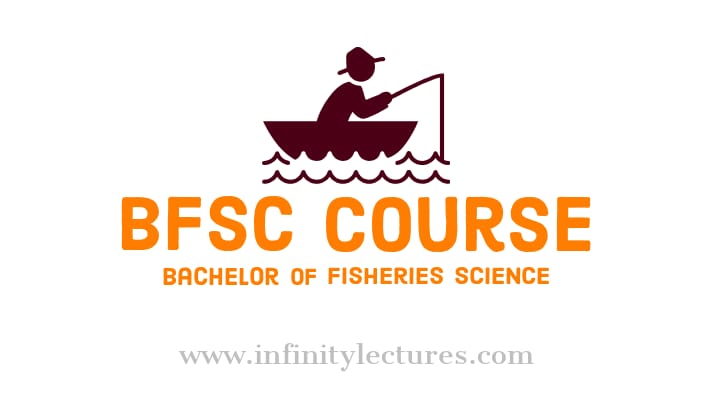BFSc course (Bachelor of Fisheries Science) is an undergraduate degree program. B.F.Sc. the course is a Fisheries Science course that focuses on processing, managing, catching, conservation and marketing of fish.
BFSc is a multidisciplinary course that includes the biological study of life and breeding of different species of fishes.
Brief Introduction: BFSc Course
Do you know, India is the world’s second-largest country of fisheries production. And China is the first largest fish producer. Therefore India’s government has decided to aim of increasing over 50% in the upcoming 5 years and they invest 25000 crores in the pipeline which clearly shows that the demand for this field and job opportunity both will increase.
Those who want to pursue BFSc course or fisheries science-related courses must have a research-oriented background that means they should be interested in the research area.
As we saw BFSc is a multidisciplinary science, it involves various disciplines of breeding aquaculture, genetics, diagnosing various disease forming and illnesses in fishes, medical treatment, and many more.
Fisheries Science Course: Degree and Diploma Courses
Now, first of all, we will see the undergraduate degree courses apart from the BFSc course.
Undergraduate Degree Courses
- BSc (Industrial Fish and Fisheries)
- BSc (Fisheries)
- BSc (Aquaculture)
Postgraduate Degree Courses
- MFSc Master of Fisheries Science
- MSc Master of Science
- PhD in Fisheries
Diploma Courses
- Diploma in Aquaculture
- Diploma in Fish Products Technology
Duration: BFSc Course
Before jump to the duration let me tell you that Bachelor of Fisheries Science course can be done full time as well as part-time (distance mode/correspondence). So, it’s up to your choice. BFSc course is a 4 years undergraduate fisheries science course that follows the semester system. Though, there are 8 semesters that imply 8 final exams in 4 years of the program.
Eligibility Criteria: BFSc Course
If you are interested in the fisheries science course, then you have to fulfill the eligibility criteria.
- You need to pass class 12th with the recognized board.
- You must have scored at least 50-60% in 12th standard.
- In order to take admission, biology must be in class 12th. But some college criteria are different for the stream. Therefore, you have to check out the eligibility criteria of a particular college.
Admission Process: BFSc Course
Admission can be done on the basis of the entrance exam to the reputed college or institute or on the bases of merit list that is base on of 12th percentage. Let’s see the common entrance exam test.
Entrance Exams:
- KCET Karnataka Common Entrance Test
- Central Institute of Fisheries, Nautical & Engineering Training Entrance Test
- Junagadh Agricultural University Entrance Test
- Maharana Pratap University Graduate Test
- Kerala Agricultural University Common Entrance Test
Fee: BFSc Course
The BFSc course fee ranges from 25000 to 2lakh. The fee is not so high it is nominal/affordable to everyone.
Course Syllabus: BFSc Course
As Bachelor of Fisheries Science is a multidisciplinary science so it involves various disciplines of aquaculture, genetics, farming, diagnosing various diseases & illnesses in fishes, medical treatment, breeding, etc. In the curriculum of BFSc course, you will get theoretical knowledge as well as hands-on and in-plant fisheries training.
SEMESTER I
- Principles of Aquaculture
- Taxonomy of Finfish
- Taxonomy of Shellfish
- Metrology and Geography
- Principles of Biochemistry
- Fishery Economics
- Fundamentals of Microbiology
SEMESTER II
- Soil and water chemistry
- Freshwater Aquaculture
- Limnology
- Food Chemistry & Fish in Nutrition
- Anatomy of Finfish and Shellfish
- Marine Biology
- Biochemical Techniques & Instrumentation
- Information and Communication Technology
SEMESTER III
- Fish nutrition and Feed Technology
- Inland Fisheries
- Statistical Methods in Fisheries
- Culture of Fish Food Organisms
- Fish oceanography
- Refrigeration and Freezing Technology
- Statistical Methods in Fisheries
SEMESTER IV
- Aquaculture Engineering
- Ornamental Fish Production and Management
- Coastal Aquaculture and Mariculture
- Fishing Craft & Gear Technology
- Physiology of Finfish and Shellfish
- Canning & Fish Packing Technology
- Extension Education in Fisheries
- Fisheries Administration & Legislation
SEMESTER V
- Aquatic Ecology & Biodiversity
- Finfish Breeding & Hatchery Management
- Diseases & Management
- Marine Fisheries
- Shellfish Breeding & Hatchery Management
- Disaster Management in Fisheries
- Navigation & Seamanship
SEMESTER VI
- Biotechnology & Bioinformatics in Fisheries
- Fishery Genetics & Breeding
- Fish Population Dynamics & Stock Assessment
- Aquatic Pollution & Coastal Zone Management
- Fish Products and by Products Technology
- Financing and Marketing Management in Fisheries
- Entrepreneurship Development and Communication Skills
SEMESTER VII
- Hands-on Training in Fisheries (Experiential Learning)
SEMESTER VIII
- In-plant training in Fisheries
Top Colleges: BFSc Course
Some of the top and reputed college that offer fisheries science courses are listed below:
- IIT Kharagpur, West Bengal
- Annamalai University, Tamil Nadu
- Osmania University, Hyderabad
- Central Institutions of Fisheries Education, Mumbai
- Central Marine Fisheries Research Institute, Kerala
- Assam Agricultural University, Jorhat
- Tamil Nadu Veterinary & Animal Sciences University
- Kerala Agricultural University, Thrissur
- Centurion University of Technology & Management, Orissa
- Mahatma Gandhi University, Kottayam
- Junagadh Agriculture University, Junagadh
- Aligarh Muslim University, Aligarh
Career Prospects: BFSc Course
On successful completion of the BFSc (Bachelor of Fisheries Science) course, you will be qualified as fisheries professionals. In order to grab better job opportunities or higher job profiles, you need to do an MFSc or MSc course which is of a Two-year program. Another option is for you to pursue an MBA program. This program will help you to obtain management skills and will thus help you to improve your qualifications as well as job profile.
You have various job opportunities in both government and private sector such as
- Research Institutes
- Fish Farms
- Nationalized Banks
- Food Departments
- Fish Processing & Marketing Firms
- Fish Diseased Diagnostic Centers
- Fish Breeding Centers
- Aquariums
- Feed Manufacturing Units
You need to go for entrepreneurship or self-employed in your own fisheries-related business.
In every state, the government has a fisheries department in which you can apply for various posts.
You can do the job in central agencies also like WHO [World Health Organization], NIO [National Institute of Oceanography], FSI [Fisheries Survey of Indian], MPEDA [Marine Product Export Development Authority], FAO [Food and Agricultural Organisation], EIA [Export Inspection Agency]
Job Profiles
- Fisheries Officer
- Farm Manager
- Aquaculturist
- Fisheries Biologist
- Fisheries Technician
- Feed Mill Manager
- Fishery Observer
- Marine Scientist
- Processing Manager
- Fish Export Inspector
- Fish Breeder/Trader
- Fisheries Technician
Some of the above job profiles might require higher education(pg courses) or some additional academic qualification.
Salary: BFSc Course
Salary in this field depends upon the candidate’s chosen specialization. The initial salary of Bachelor of Fisheries Science in the private sector may start from 3-4 lakh per annum. The salary in the government sector is different from the private sector. Also, the salary will also depend on your educational qualification as well as experience.

